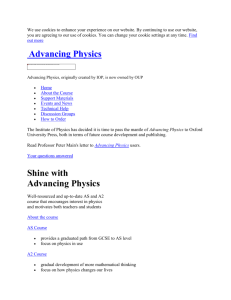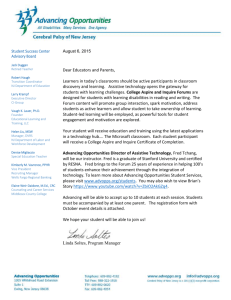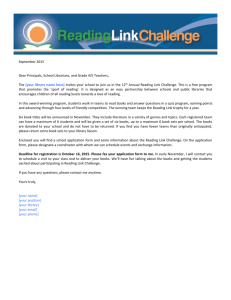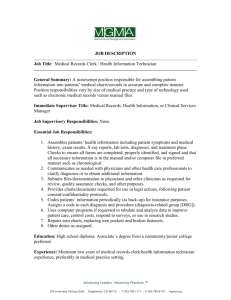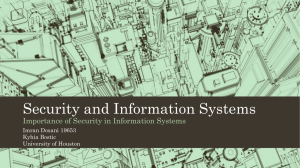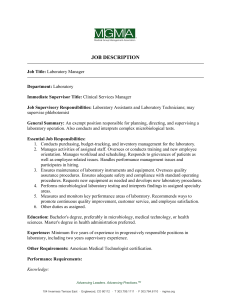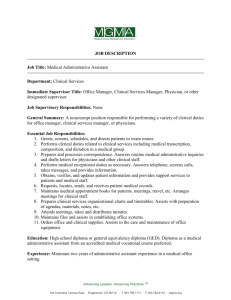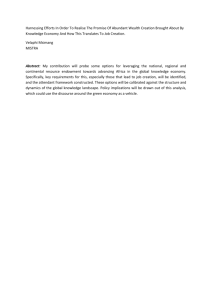Congressional Request Advancing the Science of Climate Change 1 Generic Report Summary Slides
advertisement
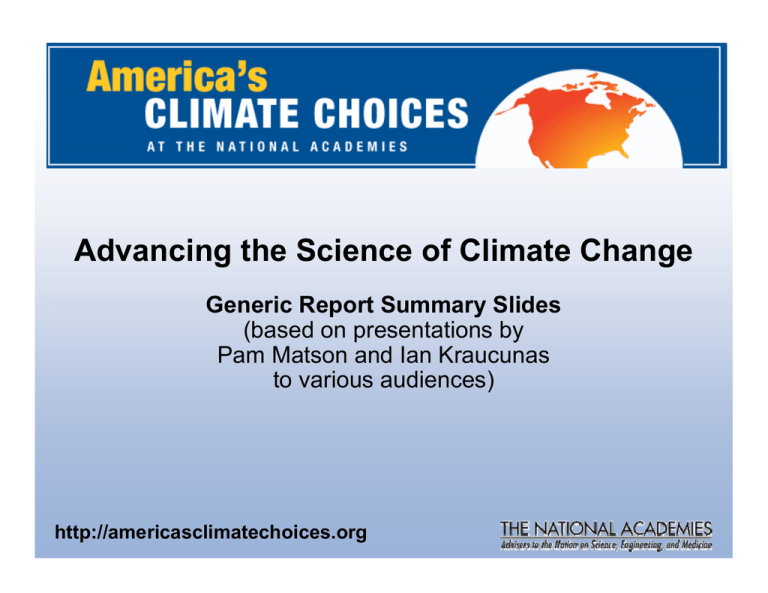
1 Congressional Request Advancing the Science of Climate Change Generic Report Summary Slides (based on presentations by Pam Matson and Ian Kraucunas to various audiences) http://americasclimatechoices.org 2 The National Academies A private, non-profit organization charged to provide advice to the Nation on science, engineering, and medicine. National Academy of Sciences (NAS) chartered in 1863; National Academy of Engineering (NAE) and Institute of Medicine (IOM) added in1964 and 1970, respectively. The National Research Council (NRC) is the operating arm of the NAS, NAE, and IOM. NAE NAS NRC IOM 3 The National Academies Study committees produce 250+ consensus reports each year, on a wide range of topics. Committees are composed of experts who serve pro bono, carefully chosen for expertise, balance, and objectivity All reports go through stringent peer-review and must be approved by the entire committee and the institution. Further information about the institution and the NRC study process available at: http://nationalacademies.org Full text and PDF summaries of reports available at http://www.nap.edu 4 A Few Examples of ClimateRelated NRC Reports 5 Study Request The Department of Commerce Appropriations Act of 2008 (Public Law 110-161) called for the National Oceanic and Atmospheric Administration (NOAA) to execute an agreement with the National Academy of Sciences to: “…investigate and study the serious and sweeping issues relating to global climate change and make recommendations regarding what steps must be taken and what strategies must be adopted in response to global climate change, including the science and technology challenges thereof.” 6 Study Overview Four panels were convened to study and write reports on: Limiting the Magnitude of Future Climate Change Adapting to the Impacts of Climate Change Advancing the Science of Climate Change Informing an Effective Response to Climate Change These four panel reports were released in May-July 2010. A Committee on America’s Climate Choices was also appointed to coordinate study activities, convene a Summit (held March 2009) and other cross-cutting activities, and write a Final Report (expected early 2011) 7 Advancing the Science of Climate Change STATEMENT OF TASK Provide a concise overview of past, present, and future climate change, including its causes and its impacts, and Recommend steps to advance our current understanding, including advances needed to improve the effectiveness of actions to limit and adapt to climate change. 8 Advancing the Science of Climate Change CONCLUSION #1: Climate change is occurring, is caused largely by human activities, and poses significant risks for a broad range of human and natural systems. The report focus on the knowledge base and research needs in 12 key areas of interest to decision makers: The Climate System Sea Level Rise / Coasts Freshwater Resources Ecosystems Agriculture and Fisheries Public Health Cities & Built Environment Transportation Energy Supply & Use Geoengineering (SRM) National/Human Security Climate Policies 9 Advancing the Science of Climate Change CONCLUSION #2: The nation needs a comprehensive and integrative climate change science enterprise, one that not only contributes to our fundamental understanding of climate change but also informs and expands America’s climate choices. “A New Era of Climate Change Research” 10 Advancing the Science of Climate Change RECOMMENDATIONS 1. The nation’s climate change research enterprise should: Be integrative and interdisciplinary, including and spanning research in the physical, social, biological, health, and engineering sciences; Focus on fundamental, use-inspired research that contributes to both improved understanding and improved decision making; and Be flexible in identifying and pursuing emerging research challenges and responding to changing knowledge needs. 11 Advancing the Science of Climate Change RECOMMENDATIONS 2. Research priorities should be set using the following criteria: Contribution to improved understanding Contribution to improved decision making Feasibility of implementation, including scientific readiness and cost …and should be set within and across the following seven cross-cutting research themes: Advancing the Science of Climate Change 12 Seven Cross-Cutting Themes for the New Era of Climate Change Research 1. Climate Forcings, Feedbacks, Responses, and Thresholds 2. Human Behaviors and Institutions 3. Vulnerability and Adaptation Analyses 4. Research to Support Strategies for Limiting Climate Change 5. Effective Information and Decision Support Systems 6. Integrated Climate Observing Systems 7. Improved Projections, Models, Analyses, and Assessments 13 Advancing the Science of Climate Change RECOMMENDATIONS 3. The federal climate change research program, working in partnership with other relevant domestic and international bodies, should redouble efforts to develop, deploy, and maintain a comprehensive observing system that can support all aspects of understanding and responding to climate change. 14 Advancing the Science of Climate Change EXAMPLES OF OBSERVATIONAL NEEDS Extend and expand long-term observations of atmosphere and ocean temperatures; sea level; ice extent, mass, and volume; and other critical physical climate system variables. Extend and expand long-term observations of hydrologic changes and related changes relevant for water management decision making. Expand observing and monitoring systems for ecosystems, agriculture and fisheries, air and water quality, human health, and other critical impact areas. Improve observations that allow analysis of multiple stressors, including changes in climate, land use changes, pollutant deposition, invasions of nonnative species, and other human-caused changes. Develop improved observations and monitoring capabilities to support vulnerability assessments of coupled human-environment systems. Develop observations, protocols, and technologies for monitoring and verifying compliance with international emissions-reduction agreements. 15 Advancing the Science of Climate Change RECOMMENDATIONS 4. The federal climate change research program, should work with the international research community and other relevant partners to support and develop advanced models and other analytical tools to improve understanding and assist in decision making related to climate change. 16 Advancing the Science of Climate Change EXAMPLES OF MODELS AND ANALYTICAL TOOLS Scenarios of future GHG emissions and other forcing factors Global and regional climate and Earth system models Process models of ecological functions and ecosystem services Integrated assessment methodologies and models Environmental cost-benefit and cost-effectiveness analyses, certification systems and standards, & lifecycle assessments Process-based decision tools and policy-oriented heuristic models and exercises. 17 Advancing the Science of Climate Change RECOMMENDATIONS 5. A single federal interagency program should be given the authority and resources to coordinate and implement a comprehensive, integrated research effort. The USGCRP could serve this role, with the following modifications: An expanded mission that includes both understanding and supporting effective responses to climate change More and better mechanisms for stakeholder interactions, e.g. user advisory processes Improved mechanisms for identifying and addressing weaknesses, gaps, and barriers (e.g., social science research) High-level, forward-looking leadership Budgeting oversight and authority 18 Advancing the Science of Climate Change RECOMMENDATIONS 6. The federal climate change research program should be formally linked with action-oriented response programs (i.e., Limiting, Adapting, Informing) 7. Congress, federal agencies, and the federal climate change research program should work with other relevant partners to expand and engage the human capital needed to carry out climate change research and response programs. Coordination, human capital, and user engagement are key issues identified in all four ACC panel reports 19 Limiting the Magnitude of Future Climate Change STATEMENT OF TASK Describe, analyze, and assess strategies for reducing the net future human influence on climate, including both technology and policy options. Focus on actions to reduce domestic greenhouse gas emissions and other human drivers of climate change, but also consider international dimensions. 20 Adapting to the Impacts of Climate Change STATEMENT OF TASK Describe, analyze, and assess actions and strategies to reduce vulnerability, increase adaptive capacity, improve resiliency, and promote successful adaptation to climate change Consider issues from a variety of sectors and covering a range of temporal and spatial scales. 21 Informing an Effective Response to Climate Change Assesses activities, products, strategies, and tools for informing decision makers about climate change and helping them plan and execute effective, integrated responses Addresses iterative risk management, climate and greenhouse gas information systems and services, and education and communication 22 America’s Climate Choices Resources & Additional Information For more information about the project http://americasclimatechoices.org For full report text online, free PDFs of report Summaries, or to order copies: http://www.nap.edu For additional information on Advancing the Science Ian Kraucunas ikraucunas@nas.edu 202-334-2546
